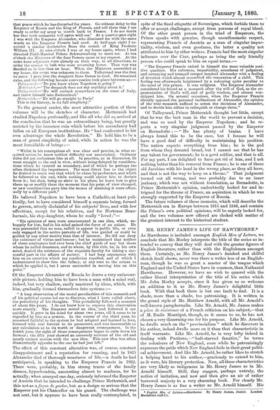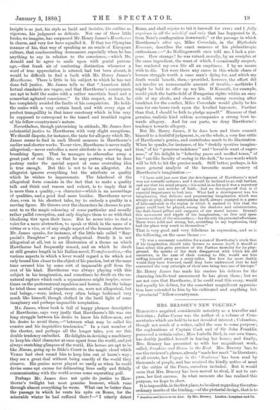MR. HENRY JAMES'S LIFE OF HAWTHORNE.* As Hawthorne is included
amongst Magi/La Men of Letters, we conclude that Mr. Morley interprets the title of the series as in- tended to convey that they will deal with the greater figures of English literature, rather than with the Englishmen amongst them. Certainly, as Mr. Henry James's finished and skilful sketch itself shows, never was there a writer less of an English- man, though he was so great a master of the tongue which England and the United States have in common, than Nathaniel Hawthorne. However, we have no wish to quarrel with the rather liberal interpretation of the title of his series which Mr. John Morley accepts, since it has given us so welcome an addition to it as Mr. Henry James's delightful little book. With that book there is but one fault to find. It is a shade, more than a shade, too patronising. It is written in the grand style of Mr. Matthew Arnold, with all Mr. Arnold's well-known paraphernalia. Like Mr. Arnold, Mr. James makes a prece de resistance of a French criticism on his subject,—that of M. Emile Mont4gut, though, as it seems to As, he has not chosen a very discerning one for his purpose. Like Mr. Arnold, he dwells much on the " provincialism " which he discovers in his author, indeed dwells more on it than that characteristic in itself warrants. Like Mr. Arnold, he is very lofty indeed in dealing with Puritans,—" half-starved fanatics," he terms the colonisers of New England, even while he patronisingly expresses the pride which New England feels in their great politi- cal achievement. And like Mr. Arnold, he rather likes to stretch a helping hand to his author,—graciously to extend to him, as it were, his literary protection. NON, all these characteristics are very likely as indigenous in Mr. Henry James as in Mr. Arnold .himself. Still, they suggest, perhaps nntrnly, the notion of imitation, and now and then give an air of rather borrowed majesty to a very charming book. For clearly Mr. Henry James is as fine a writer as Mr. Arnold himself. His
* English Men of Letters.—Rawlhorne. By Henry James, Junior, London Macmillan and Co.
insight is as just, his style as lucid and incisive, his outline as vigorous, his judgment as delicate. Not one of these little books, we imagine, has surpassed Mr. Henry James's Hawthorne in charm, and very few have equalled it. If that too Olympian manner of his, that way of speaking as an oracle of European culture, that condescending demeanour, especially when he has anything to say in relation to the conscience,—which Mr. Arnold and he agree to smile upon with genial patron- age,—that frank air of conferring distinction whenever a word of true appreciation is uttered, had but been absent, it would be difficult to find a fault with Mr. Henry James's Hawthorne. There is little in his subject to which he has not done full justice. Mr. James tells us that "American intel- lectual standards are vague, and that Hawthorne's countrymen are apt to hold the scales with a rather uncertain hand and a somewhat agitated conscience." In this respect, at least, he has completely avoided the faults of his compatriots. He holds the scales with a very certain hand, and with every sign of perfect tranquillity in that inner sanctuary which in him may be supposed to correspond to the tossed and troubled region of his fellow-countrymen's nature.
Nevertheless, though patronising in attitude, Mr. James does substantial justice to Hawthorne, with very slight exceptions. We should dispute, for instance, the taste for allegory which Mr. James seems to find in such liberal measure in Hawthorne's earlier and shorter works. To our view, Hawthorne is never really allegorical,—never embodies a mere attribute in a moving and breathing figure. That he manages to etherealise away a great part of real life, so that he may portray what he does portray under the special aspect of some overruling idea is true enough. But this is not to be an allegorist. An allegorist ignores everything but the attribute or quality which he wishes to impersonate. The falsehood of the allegorical form consists in the fact that to make a quality talk and think and reason and exhort, is to imply that it is more than a quality,—a character—which is an assemblage of qualities, and a good deal more besides. Hawthorne never does, even in his shortest tales, try to embody a quality in a moving figure. He throws over the characters he chooses to pre- sent to us the magic colouring of some particular and usually rather pallid conception, and only displays them to us with that idealising tint upon their faces. But he never tries to find a voice for a mere abstraction, to speak or think in the name of a virtue or a vice, or of any single aspect of the human character. Mr. James speaks, for instance, of the little tale called " Rap- pacini's Daughter" as purely allegorical. Surely it is not allegorical at all, but is an illustration of a theme on which Hawthorne had frequently mused, and on which he dwelt at still greater length in his Italian novel, Transformation,—the various aspects in which a lover would regard a tie which not only bound him closer to the object of his passion, but at the same time severed him by some sort of impassable gulf from the rest of his kind. Hawthorne was always playing with this subject in his imagination, and sometimes he dwelt on the un- natural rapture which such a separateness might inspire, some- times on the preternatural repulsion and horror. But the beings he tried these mental* experiments on, were not allegorical, but real beings,—were, indeed, very often beings fashioned very much like himself, though clothed in the lurid light of some imaginary and perhaps impossible temptation.
Mr. James, whose book is full of happy phrases descriptive of Hawthorne, says very justly that Hawthorne's life was one long struggle between his desire to know his fellow-men, and his desire to avoid them,—" between what may be called his evasive and his inquisitive tendencies." In a vast number of the shorter, and perhaps all the longer tales, you see this double tendency embodied. He delights in devising a machinery to keep his chief character at once apart from the world, and yet always snatching glimpses of the world. His heroes are apt to be like iEneas, going up to Dido's Court in the magic cloud which Venus had shed round him to keep him out of harm's way ; they see a great deal without being exactly of the world they observe. His genius never played so easily as when he could devise some apt excuse for delineating lives sadly and fitfully communicating with the world across some separating gulf.
Perhaps Mr. James does not quite do justice to Haw- thorne's twilight but most genuine humour, which runs through almost everything he wrote. What can be better than the passage in which he vents his spite on Rome, for the miserable winter he had suffered there ?—" I utterly detest Rome, and shall rejoice to bid it farewell for ever ; and I fully acquiesce in all the mischief and ruin that has happened to it, from Nero's conflagration downward ;" or the passage in which Hawthorne's alter ego, Miles Coverdale, in the Blythedale Romance, describes the exact measure of his philanthropic enthusiasm :—" As Hollingsworth once told me, I lack a pur- pose. How strange ! he was ruined, morally, by an overplus of the same ingredient, the want of which, I occasionally suspect, has rendered my own life all an emptiness. I by no means
wish to die. Yet were there any cause in this whole chaos of human struggle worth a sane man's dying for, and which my death would benefit, then,—provided, however, the effort did not involve an unreasonable amount of trouble,---methinks I might be bold to offer up my life. If Kossuth, for example, would pitch the battle-field of Hungarian rights within an easy ride of my abode, and choose a mild, sunny morning after breakfast for the conflict, Miles Coverdale would gladly be his man for one brave rush upon the levelled bayonets. Further than that, I should be loth to pledge myself." Humour of that genuine, realistic kind seldom accompanies a strong bent to- wards allegory. And for our parts, we deny Hawthorne's tendency towards allegory.
But Mr. Henry James, if he does here and there commit himself to a doubtful judgment, is, on the whole, a very fine critic of Hawthorne's genius, and contributes much to its illustration. When he speaks, for instance, of his "duskily sportive imagina- tion," of his "generous indolence" and " loveable want of eager- ness," of his delight in "loitering paces and muffled tones," of his "cat-like faculty of seeing in the dark," he uses words which will be felt to hit the precise mark. Still better, perhaps, is his more general analysis of the favourite moral scenery of Hawthorne's imagination :—
"I have said just now that the development of Hawthorne's mind was not towards sadness; and I should be inclined to go still further, and say that his mind proper,—his mind in so far as it was a repertory of opinions and articles of faith,—had no development that is of especial importance to look into. What had a development was his imagination, that delicate and penetrating imagination which was always at play, always entertaining itself, always engaged in a game of hide-and-seek in the region in which it seemed to him that the game could best be played, among the shadows and substructions, the dark-based pillars and supports of our moral nature. Beneath this movement and ripple of his imagination,—as free and spon- taneous as that of the sea-surface,—lay directly his personal affections. These were solid and strong, but, according to my impression, they had the place very much to themselves."
That is very good and very felicitous in expression, and so is the following, on the same theme :—
"It was a necessary condition for a man of Hawthorne's stock that if his imagination should take licence to amuse itself, it should at least select this grim precinct of the Puritan morality for its play- ground. He speaks of the dark disapproval with which his old ancestors, in the case of their coming to life, would see him trifling himself away as a story-teller. But how far more darkly would they have frowned, could they have understood that he had converted the very principle of their own being into one of his toys."
Mr. Henry James has made his readers his debtors for the charming intellectual amusement Ile has given them ; but we are not sure that Hawthorne, if he could read this essay, would feel equally his debtor, for the somewhat magnificent apprecia- tion here extended to him by his cultivated and anything but " provincial " fellow-countryman.











































 Previous page
Previous page